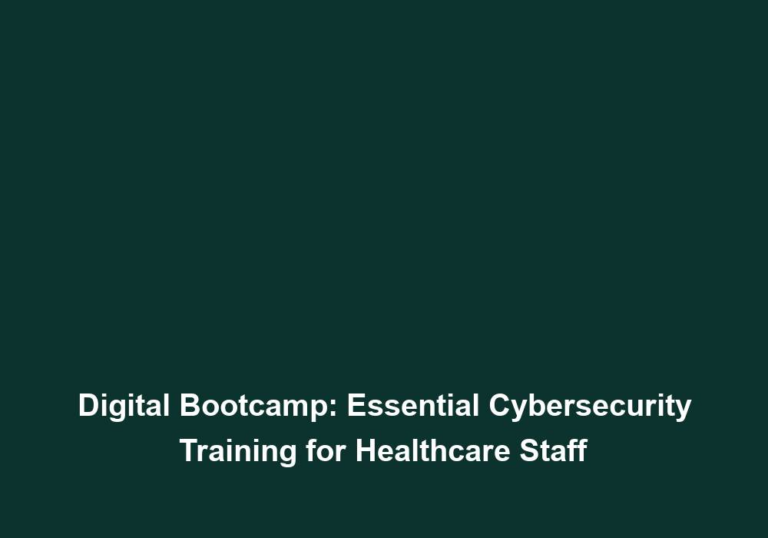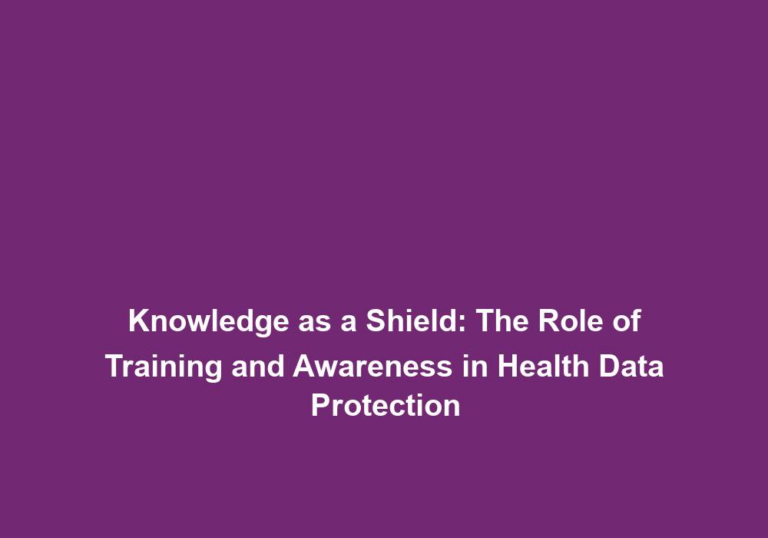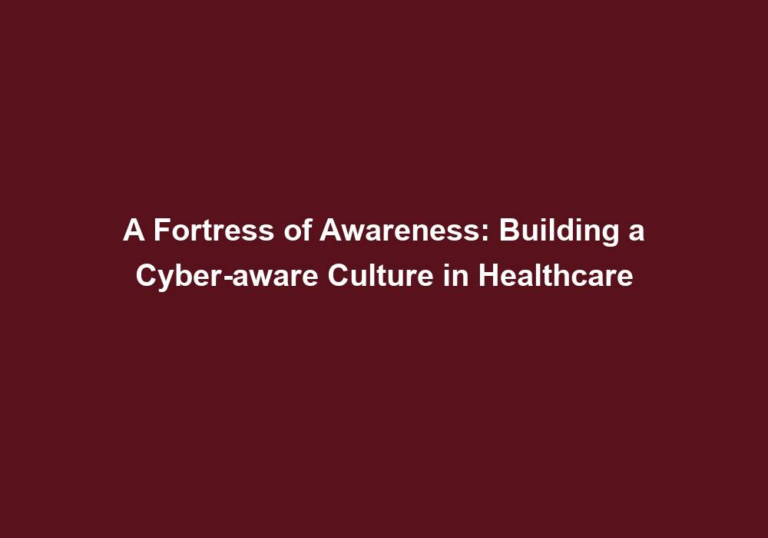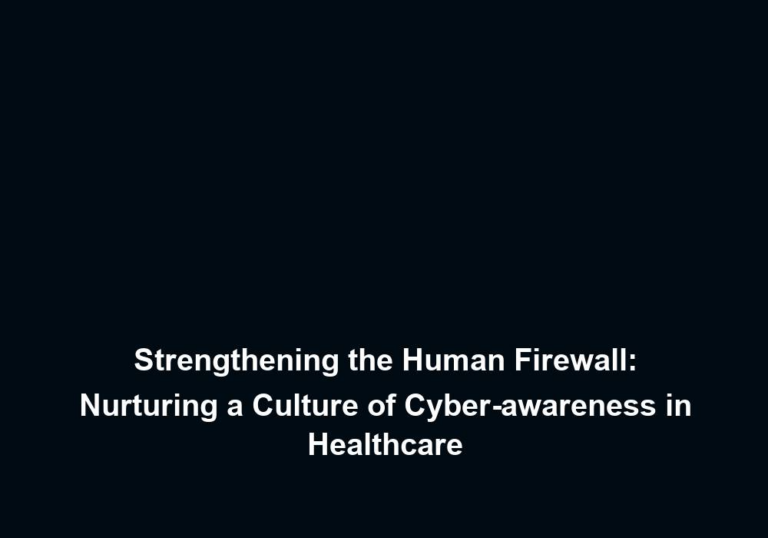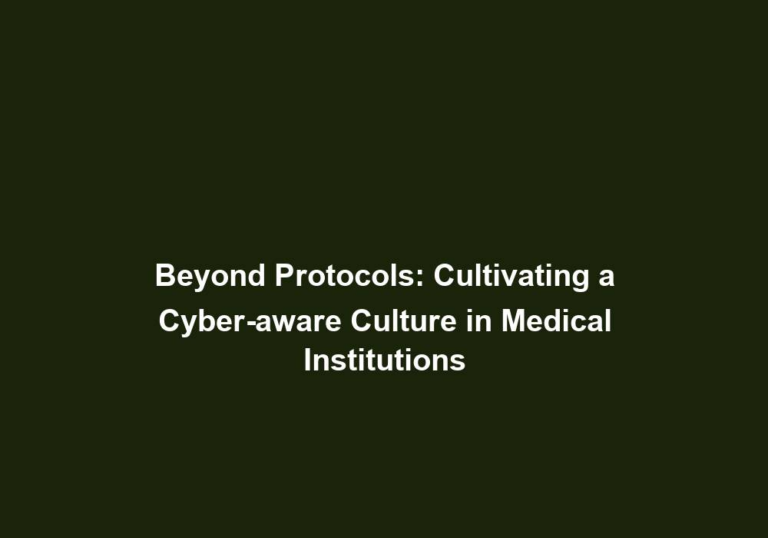Securing the Frontline: Comprehensive Cybersecurity Training for Healthcare Professionals
In today’s digital age, cybersecurity has become a critical concern for businesses and industries across the globe. The healthcare sector, in particular, is vulnerable to cyber threats due to the sensitive nature of the data it handles. To combat this growing menace, healthcare professionals must receive comprehensive cybersecurity training. In this article, we will explore the importance of such training and discuss key aspects that should be covered to ensure a secure frontline.
Why is Cybersecurity Training Crucial for Healthcare Professionals?
-
Protecting Patient Data: Healthcare organizations store a vast amount of sensitive patient information, such as medical records, insurance details, and social security numbers. Cybersecurity training equips healthcare professionals with the knowledge and skills to safeguard this data from unauthorized access, identity theft, and data breaches. By understanding the importance of protecting patient data, healthcare professionals can take proactive measures to ensure its security.
-
Preventing Financial Loss: A cyberattack can have severe financial implications for healthcare organizations. Training healthcare professionals on cybersecurity best practices can help mitigate the risk of financial loss resulting from ransomware attacks, fraud, or financial scams. By learning about the different types of cyber threats, healthcare professionals can identify potential risks and implement effective preventive measures, reducing the likelihood of financial loss.
-
Preserving Reputation and Trust: A data breach or cybersecurity incident can significantly damage the reputation and trust of a healthcare organization. By training healthcare professionals on cybersecurity, organizations demonstrate their commitment to protecting patient privacy, thereby enhancing their reputation and fostering trust among patients. This trust is crucial in maintaining strong patient-provider relationships and ensuring the continued success of healthcare organizations.
-
Complying with Regulatory Requirements: The healthcare industry is subject to various regulations, such as the Health Insurance Portability and Accountability Act (HIPAA). Cybersecurity training ensures that healthcare professionals are well-versed with these regulations and can implement necessary measures to remain compliant. By staying up to date with regulatory requirements, healthcare professionals can avoid penalties and legal consequences, further safeguarding the organization’s operations.
Key Aspects of Comprehensive Cybersecurity Training
-
Understanding Cyber Threats: Healthcare professionals should be educated about different types of cyber threats, including malware, phishing attacks, ransomware, and social engineering. This knowledge helps them recognize potential risks and take preventive measures. By understanding the tactics employed by cybercriminals, healthcare professionals can identify and respond appropriately to potential threats.
-
Creating Strong Passwords: Passwords are the first line of defense against unauthorized access. Training should emphasize the importance of creating strong passwords that are unique, complex, and regularly updated. Additionally, healthcare professionals should learn about password management tools and techniques. By implementing strong password practices, healthcare professionals can significantly reduce the risk of unauthorized access and protect sensitive information.
-
Implementing Multi-Factor Authentication: Multi-factor authentication adds an extra layer of security by requiring users to provide additional verification factors, such as a fingerprint or a one-time password. Training should focus on implementing and promoting the use of multi-factor authentication across healthcare systems. By implementing multi-factor authentication, healthcare professionals can ensure that only authorized individuals have access to sensitive data, enhancing overall security.
-
Data Encryption: Healthcare professionals should understand the concept of data encryption and its significance in protecting sensitive information. Training should cover encryption methods, such as symmetric and asymmetric encryption, and their application in healthcare settings. By implementing data encryption techniques, healthcare professionals can prevent unauthorized access to sensitive information, even if it is intercepted during transmission or storage.
-
Recognizing Social Engineering Tactics: Social engineering tactics, such as impersonation, phishing emails, and phone scams, can trick healthcare professionals into revealing sensitive information or granting unauthorized access. Training should include real-life examples and simulations to educate professionals on how to identify and respond to social engineering attempts. By recognizing social engineering tactics, healthcare professionals can avoid falling victim to such attacks and protect patient data.
-
Implementing Secure Network Infrastructure: Healthcare organizations rely on complex networks to store, process, and transmit data. Training should cover secure network infrastructure practices, including firewalls, intrusion detection systems, and regular network monitoring to detect and prevent cyber threats. By implementing robust network security measures, healthcare professionals can ensure the integrity and confidentiality of patient data.
-
Incident Response and Reporting: Healthcare professionals should be trained on how to respond to cybersecurity incidents promptly. This includes reporting the incident to the appropriate authorities, documenting the details, and implementing measures to prevent similar incidents in the future. By having a well-defined incident response plan, healthcare professionals can minimize the impact of cybersecurity incidents and prevent further compromise of patient data.
-
Regular Updates and Patch Management: Software vulnerabilities can be exploited by cybercriminals to gain unauthorized access. Training should stress the importance of regularly updating software, installing security patches, and keeping systems up to date to mitigate risks. By maintaining up-to-date software, healthcare professionals can ensure that known vulnerabilities are patched, minimizing the risk of exploitation.
-
Securing Mobile Devices: Healthcare professionals often use mobile devices to access patient data remotely. Training should cover best practices for securing mobile devices, including password protection, encryption, and the use of secure Wi-Fi networks. By implementing these practices, healthcare professionals can ensure the security of patient data even when accessing it on mobile devices.
-
Awareness and Vigilance: Cybersecurity training should instill a culture of awareness and vigilance among healthcare professionals. They should be encouraged to report suspicious activities, adhere to security protocols, and stay informed about the latest cybersecurity trends and threats. By fostering a culture of awareness and vigilance, healthcare professionals can actively contribute to the overall security posture of the organization.
By providing comprehensive cybersecurity training to healthcare professionals, organizations can build a secure frontline capable of defending against ever-evolving cyber threats. Staying up to date with emerging technologies, industry best practices, and regulatory requirements is crucial for ensuring the privacy and security of patient data. Together, let’s empower healthcare professionals to protect patient information and contribute to a safer digital healthcare environment.


